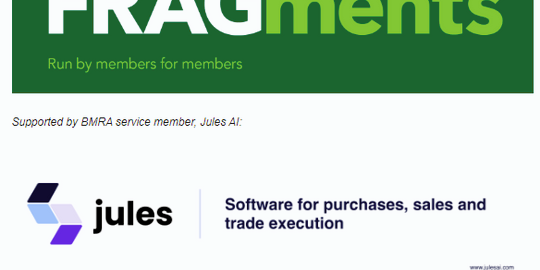How the UN-backed campaign is influencing its action on sustainability
BMRA member, EMR, is going through an exciting and challenging transition which is putting sustainability and awareness of its environmental impact at the heart of everything it does.
It has committed to become a fully net-zero business by 2040. To do this in a way that is both measurable and internationally recognised, it has joined a small, but growing number of significant organisations in committing to achieving net-zero carbon emissions across all scopes (1, 2 and 3[1]) by 2040 through the development of science-based targets.
By making this commitment, EMR has joined the Race to Zero[2], a global campaign supported by the United Nations, which brings together 454 cities, 23 regions, 1,397 businesses, 74 investors as well as 569 universities from every corner of the world. By joining the Race to Zero it is able to ensure that its efforts are aligned with some of the world’s leading climate scientists.
This commitment is designed to play its part in the effort to limit global warming to 1.5° - the higher level ambition under the Science Based Targets initiative (SBTi)[3].
Climate scientists agree that anything above that would mean the degree of change to the environment would be more acute, longer lasting and would be a lot more difficult for humankind to deal with. This is the guiding principle for science-based targets and highlights just how much is at stake.
The SBTi features many household names, including Jaguar Land Rover, Rolls Royce, General Motors, Coca Cola, Scania, BT and Unilever, with each agreeing to meet the net-zero target. By standing alongside these firms, EMR is proud to be taking a lead in the recycling industry.
So, how does the SBTi fit within the work EMR is already doing? The targets are split into three parts (Scope 1, 2 and 3) and have helped to define the direction and timing of its wider ‘Decade of Action’ strategy.
Scope 1 represents all direct emissions produced by a company in its day-to-day activities including the use of fossil fuels and emissions created during the processing of products. Scope 2, meanwhile, includes indirect emissions associated with the purchase and use of electricity.
We will meet these targets by transitioning towards 100% renewable electricity by 2030 (RE100 initiative[4]). We are also enabling our colleagues to transition to electric vehicles (EV100 initiative[5]) and making good progress on energy efficiency and productivity (EP100 initiative[6]).
There is much more to do over the coming years if EMR is to meet its ambition. Many of its near-term actions focus on Scope 1 (direct carbon emissions from our operations) and Scope 2 (indirect carbon emissions associated with electricity consumption).
Scope 3 is more difficult. This is a commitment to remove carbon emissions from along the chain of activities a business is associated with, in EMR's case those supplying EMR with materials and its ultimate customers.
Like many other companies, EMR acknowledges that tackling Scope 3 carbon emissions will be more challenging. For a company that works closely with the construction, transport and steel industries, this is a challenge that EMR is prepared to tackle ‘head-on’, as part of our overall commitments for net-zero carbon emissions by 2040.
It has already made a good start through a joint study with the Carbon Trust where it has established a footprint for some of its key products.
EMR wants to work closely with its customers and suppliers in an effort to help them to progress to their own carbon ambitions. It also needs to support companies and industries which are on their own trajectories, developing technologies such as zero carbon shipping or developing its own products to improve the productivity and quality of steelmaking from recycled raw materials.
The good news is that by working towards its targets across all scopes (1, 2 and 3), with its customers and suppliers, EMR will be able to produce low and zero carbon products that will help its clients and customers meet its own net-zero goals. This will give every business along EMR’s supply chain a clear competitive advantage in a world that is putting increasing focus on operating more sustainably.
And it underlines one of the key messages of EMR's ‘Our Decade of Action’ strategy: the Race to Zero isn’t only vital for the planet; it is also good for business.
[1] Greenhouse Gas Protocol – A Corporate Accounting & Reporting Standard
[3] Science Based Targets Initiative Business Ambition for 1.5oC Commitment Letter (v1.3)
[4] https://www.theclimategroup.org/about_re100



